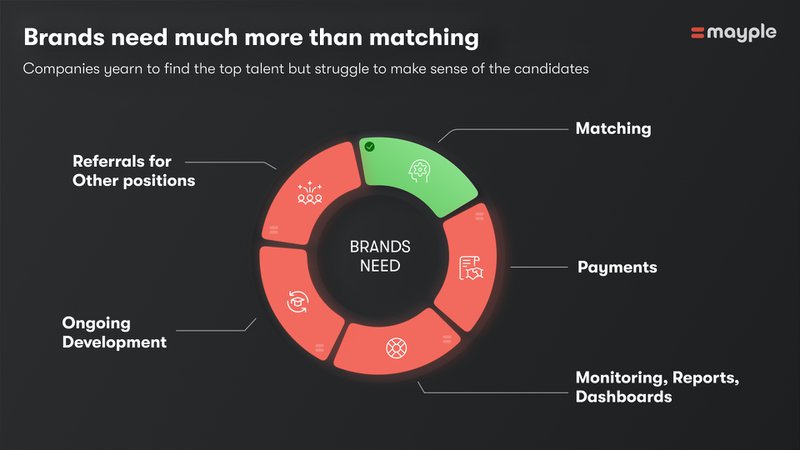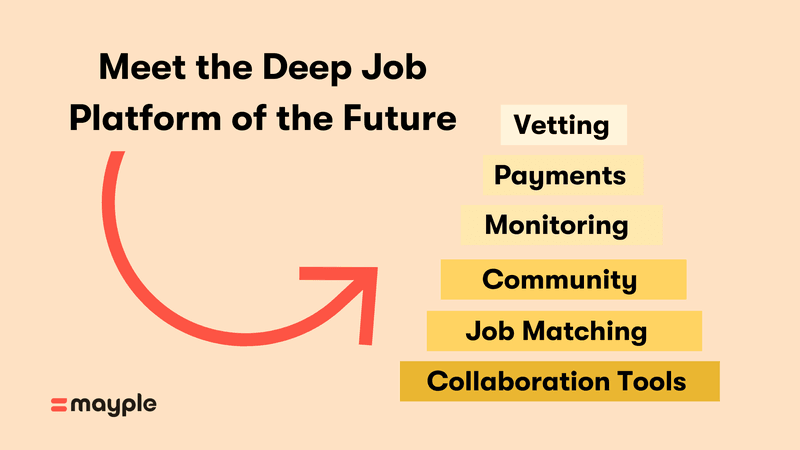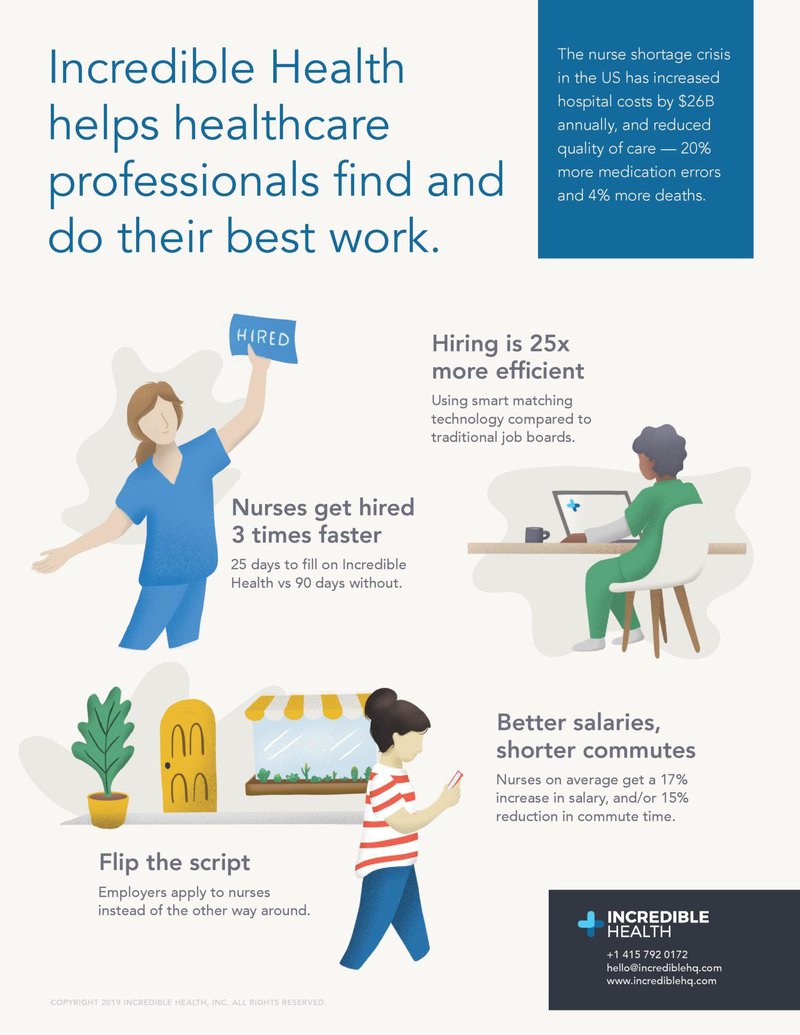Deep Job Platform: The Transformation of the Remote Workplace
With over 1.1B freelancers to choose from globally, you need a place you can trust to find and filter the ideal candidate. Enter the rise of the deep job platform. It's how the top brands succeed.
Updated November 20, 2023.

There’s been a massive change in the job market in 2020-21.
Freelancers represent over 35% of the global workforce, that’s more than 1.1 billion freelancers!
In the US alone, the number of freelancers is set to rise to a total of 50% of the workforce by 2027.
On the other hand, almost 33% of the Fortune 500 companies work with freelancers today.
Over 73% of freelancers are looking for jobs on dedicated online platforms.
With a growing number of freelancers looking for the right opportunity, we’ve seen an increased need for better solutions to match brands with top-level talent.
Freelancers need more than just a good matching system. They need healthcare, insurance, on-the-job training, a sense of community, better payment processing, and more tech that makes their job easier.
Brands are also having a really tough time finding the right freelancers to work with. With more than a third of the worlds’ workforce becoming freelancers, there are just too many options out there, and it’s hard to filter through the noise and get access to the world’s top talent.
With so much talent out there, a shoe company can hire a marketer that has 5+ years of experience running ads in that industry. A health startup can find a growth manager that has had 10+ years of experience working for the top health brands in the world. All these people are available in today’s job market, they're just not easily accessible.
Brands need help vetting candidates, seeing their actual marketing results (and not just fancy testimonials), it helps to have a neutral 3rd party to oversee the entire process and help make sure that the work is being done correctly and efficiently.
This is where the deep job platform enters the picture.
We’re here to achieve the dream of creating the job platform of the future. One that provides the needed blend of benefits for both freelancers and brands and helps innovate and disrupt industries in ways that weren’t possible before.
In this post, we’re going to discuss what trends led to this new need in the job market, some of the features & benefits of the deep job platform, and some of the incredible examples of what’s out there.
Let’s dive in.
The origins of the deep job platform
Let’s go back to the beginning.
Back in 2009, America was coming out of the “Great Recession,” and high tech started booming again. Over 25% of the workforce was unemployed and looking for jobs. So naturally, a lot of people chose to become freelancers or independent consultants.
This was the boom of freelancing.
There were a lot of talented candidates but employers had no way of accessing them. That’s where we saw the rise of the earliest online job boards - like Craigslist, Jooble, and Indeed.
These were very simplistic sites that offered basic matchmaking between the brands and the applicants. This is where we saw the birth of the first service marketplaces, like Fiverr and UpWork, where employers could finally get access to lists of relevant freelancers and even hire them through the platform.
But, these marketplaces only offered the very basic features - filters to scan lists of freelancers and reviews/project examples for each candidate.
This wasn’t enough.
It was still difficult for companies to find the right candidates.
This problem was exasperated by the global epidemic that pushed so many companies to go fully remote. Now we have remote workers, and firms are more open than ever to hiring freelancers and working with them on several projects, often for long-term projects.
According to a recent study from Buffer, 80% of workers work from home, and only 9% actually work from the company office.
The problem is, the entire process of hiring a freelancer takes much more time because of all the available data out there, and companies now need much more than just basic matching.
The Transition from “Matchmaker” to Deep Job Platform
Brands have 4 main difficulties when using basic marketplaces (shallow job platforms).
1. There are too many options.
Companies see a long list of freelancers and don’t know who to pick and which criteria to use.
There are just too many options out there. Brands are forced to contact 40-50 people that seem qualified only to find out the most basic info about them - which industries they have experience with, how many years they have worked in each industry, and what their results were like.
2. There is little to no transparency
There is no systematic way to see the actual data from the marketing campaigns that these candidates managed. So brands have no way of vetting these candidates based on past performance.
3. Hard to monitor progress
On the other hand, once a company hires a freelancer, they need tools to keep track of their performance, and someone to interpret the data for them. Traditionally, this has been the job of a marketing manager who managed a team of freelancers, but the truth is, it can all be done by an advanced platform.
4. Hard to replicate for other positions
Once a brand sees success with one marketing channel they may want to expand into another channel. The first freelancer that worked with them may not have the expertise and the brand has to start the hiring process from scratch.
Companies need a platform that can help them with the entire hiring process - not only finding a freelancer but also - vetting them, communicating with them, automating payments, onboarding, monitoring, reporting, and analyzing their results.
Hiring a freelancer has become a journey, not just a destination. The matching or the discovery phase is just the first leg of the journey. The problem is that the Matchmakers of the world couldn't offer more than just matching, and this is where the idea for the deep job platform was born.
What is a Deep Job Platform?
A deep job platform is a SaaS + marketplace combination. It’s a comprehensive platform with features designed to match brands with candidates more efficiently, with built-in automation all along the employment journey including - vetting, monitoring, insurance, payments, reporting, digital tools, etc.
Here’s an example.
The eBay vs Amazon Comparison
eBay is a “matchmaker” kind of marketplace. It merely connects the buyer to the seller, without offering any of the other features. For example, when you buy something on eBay you have to communicate with the seller yourself, and the seller, in turn, has to ship the product themselves.
On the other hand, Amazon offers full protection to the buyer, they don’t even have to contact the seller to cancel their order or get a refund! On the seller side, Amazon offers FBA (fulfilled by Amazon) where they store and ship the products themselves. They also have a sophisticated advertising platform where the seller can get more exposure and increase their sales.
Here are all the features (so far) that eBay does not offer, which Amazon has developed in all their verticals:
Amazon offers brands: -An advertising platform -An advanced storefront -Amazon posts -Fulfilment services -The Amazon affiliate program -Merch by Amazon -Next day and 2-day delivery
Amazon offers shoppers: -An A-Z guarantee -A better experience - it’s easier to find items -A streamlined buying process -Amazon Prime benefits -Checkout with 1 click -A 30-day return policy
In short, there are a lot of features built-in to Amazon that don’t exist on eBay.
Did this analogy help you understand the concept? It becomes the platform’s job to create features that protect the seller and the buyer, or in Mayple’s case, the Marketer and the business. It’s also our role to make sure the entire process is intuitive and simple for both sides.
Here are a few of the top features provided by today’s Deep Job Platforms.
Features of a Deep Job Platform
There are features all along the hiring & management journey that become an essential part of the value offered by the deep job platform.
Advanced built-in tech
Deep job platforms often come with a huge stack of features built-in that make life easier for companies as well as freelancers.
Top feature? Algorithms that match freelancers based on specific job experience by pulling their data from different platforms they’ve used.
Hired is a marketplace for engineers that has developed great assessment and interviewing tools to help companies find the perfect candidate faster.
Incredible Health is a platform where hospitals can find and hire nurses quickly and seamlessly. They’ve even built a credentialing feature that automates the entire process of checking the candidate’s experience and education.
Candidates can focus on doing what they love
Some platforms build features to make it easier for the candidates to do their jobs. These platforms take some of the day-to-day tasks and automate them, so the candidates or freelancers can focus on perfecting their craft.
Here at Mayple, we act as the marketer’s back office. We handle and automate all the payments, communicate weekly with the brands (the customers), handle reporting, and even onboarding. This cuts the marketer’s work by 50%+ per week and they now have more time to take on more projects or get new clients.
Creating new value
The entire process of hiring, vetting, and managing freelancers used to be very complicated and had a lot of gaps in it. Deep job platforms strive to fill those gaps by solving bottlenecks.
For example - RigUp is a vertical marketplace that helps companies find and recruit construction workers. A major cause of delay in the hiring process in the construction industry comes from handling liability insurance for each worker. RigUp was able to speed up the insurance process and onboard construction workers in less than 24 hours.
These are just a small sample of the myriad features that deep job platforms provide. On top of that, their value is positively impacted by several really important market trends.
Favorable market trends
The market has become tremendously ripe for these platforms and for several really good reasons.
COVID19 put remote work on the map
COVID has certainly created new trends and ways of living for everyone around the globe, and it has also sped up existing trends.
In 2018, before COVID, 3.2% of the US workforce was fully remote.
In 2020, post-COVID, that number rose to 18%.
That is a huge increase, but the trend was already there. 70% of people globally were working remotely at least once a week in 2018.
As unemployment rose to an all-time high of 14.7% at the onset of the pandemic, Andreessen Horowitz predicted a “Great Rehiring” once the vaccine was readily available. There would literally be millions of people going back into the workforce and the job market was going to get even more competitive.
Performance KPIs are digitized
Remote work spread so fast because everything is becoming digitized. People’s performance can now be measured using KPIs, analytics, and data that wasn’t available 5-10 years ago.
A lot of SaaS tools came on the scene that make this a reality across most industries today. Everything from customer success to development, performance marketing, and everything can be measured online based on leading and lagging indicators.
It’s also become much easier to test the results and view them in real-time. A company doesn’t need to go through a 60-90 day process of hiring and vetting an agency only to find out that they are not a good fit. Now, they can test a freelancer on a much smaller scale in just a week or two.
How platforms will change the future
The job market is the greatest industry in the world today. It hasn't changed for years, and all of a sudden it's being transformed in a dramatic way, and at an exponential rate.
Companies like Apple and Google are committing to a work-from-home future. Marketing consultants can utilize all their strengths by working with multiple clients at once.
Collaboration between colleagues is happening via Zoom and other video-sharing apps. Companies are increasingly using mobile apps to centralize internal communications and automate systems. Traditional management has been completely disrupted and is ripe for adapting to deep job platforms to find skilled candidates.
Some say that this vision of the “Future of Work” is already happening and the deep job platform provides the much-needed infrastructure to help companies adapt to the “New Normal”.
Here at Mayple, we are creating the marketing platform of the future. The place where a company can get access to the world’s top marketers for a variety of projects - email marketing, PPC, ads management, marketing strategy, social media, and more. For the marketer, we are creating an online community and a much more effective way of utilizing their time.
Companies can now find the perfect candidate, with deep experience in their industry and a proven record of success. They can now monitor the progress and have more transparency on the results of the candidate’s work. They also get the peace of mind that comes with someone else taking care of the management and quality assurance of their team.
Freelancers, in turn, can find new clients more easily and can focus on doing what they love while letting the platforms automate everything else - payments, dashboards, insurance, and communication with the client. They also benefit from the security, technology tools, and professional guidance of a well-managed community.
With these innovations, the “New Normal” is quickly turning out to be a “Better Normal”, for both candidates and employers, one that will forever change the face of the job industry.












